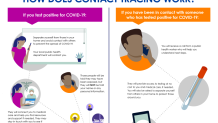We're hearing a lot about contact tracing lately, as part of efforts to contain coronavirus. Con artists are aiming to take advantage of it, too.
The California Department of Public Health, or CDPH, uses contact tracing to connect the dots while containing COVID-19. If someone tests positive for the virus, the state wants to alert all the people with whom that patient may have had face-to-face contact. It will then offer virus testing to all those potential contacts, and encourage them to self-isolate as much as possible.
To spread the word about contact tracing, CDPH created this public service announcement video:
CDPH Director Dr. Sonia Angell narrates the short video. "Here’s what you can expect: you’ll receive a call from a public health worker who will help you understand your infection risk," she says.
That call is where the U.S. Federal Trade Commission expects to see scammers take aim. They will likely pose as contact tracers to trick people.
How can you tell if a purported contact tracing call, text, or email is legitimate?
First: contact tracing is being run by a new state program, California Connected. The state says California Connected callers will only share health information about possible exposure. They will not ask for any personal information, like your Social Security Number or bank accounts. They won't ask any personal health questions. And, they will not charge you anything.

If a "contact tracing" caller starts asking for money or personal information, hang up, then report them to your county health department.
Coronavirus Pandemic
Full coverage of the COVID-19 outbreak and how it impacts you.
The state says it might send a text message or an email before calling. A real one will tell you to expect a call from California Connected. A phony message might include a link for you to tap. Never open a link in an unknown text or email message; it could expose your phone or PC to hackers.
You can learn more about contact tracing at californiaconnected.ca.gov.


